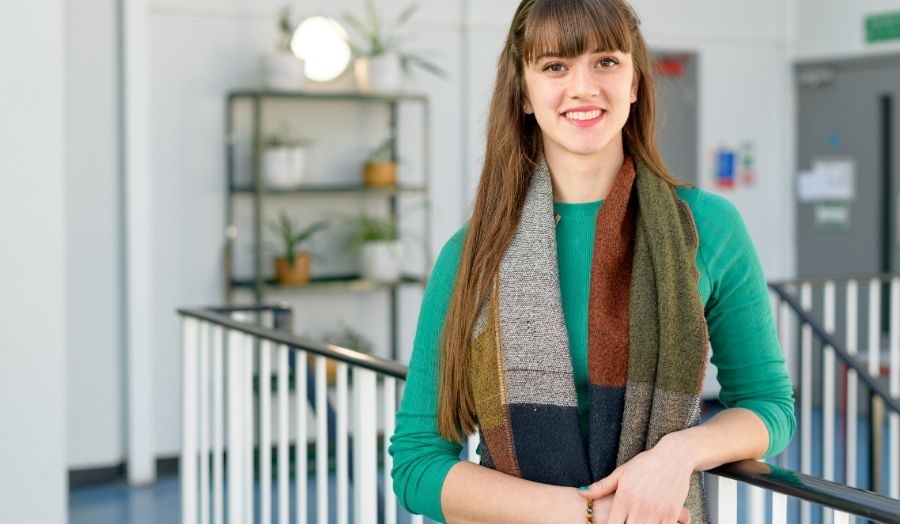Valeria Cibaku graduated from London Met with an Early Childhood Studies BA with Licence to Practice in 2016, and has since taken on a job as a research assistant at Oxford University, working on a project to improve educational outcomes in Malawi. We caught up with her to find out what she's been doing since her time at London Met.
What interested you about early childhood studies? Did anything in particular inspire you to get into that area?
I come from a background where children are constantly being taught, rather than being made to think, which is a very different educational style. I have always been passionate about working with children, and educating them in a way that does make them think. I wanted to be part of a child’s journey and make that difference. I learn so much from them as well.
The way I think about early years is like an apple tree; people will complain if mouldy apples fall from the tree, but they’re not looking at what is happening in the ground, in the soil, if it’s being watered enough. They’re only looking at the fruit. If you don’t nurture the roots, whatever grows won’t be that amazing. Early childhood is that root, so we need to make sure that it is nurtured, well-fed and well-watered, so it can grow.
Can you tell me a bit about the research project you’re working on?
It’s a five-year project, and we’re currently in year four, working to improve the quality of education in Malawi. I’m a project officer, and my focus is on designing a leadership training programme for the headteachers there, the deputy heads and the early years educational advisors in Malawi. So far we’ve been interviewing and surveying people to understand a bit more about resource management, and we will be implementing new training interventions among the educators based on our learnings so far. I will be going out there in May, and we hope to start seeing an impact from next summer.
How did your studies at London Met help you to achieve your ambitions and get started in this career?
Through my studies here I learnt so many theories and gained so much knowledge about how to reflect and critically analyse different situations. But I think what made the biggest difference was the people I interacted with, who really drove my passion to a higher level than I even knew I could have. The people here inspired me to want to make that difference, and realise that this is not just a degree. Working in early years means you are there to make the difference at the foundation of children’s lives, which is an enormous opportunity.
The leadership training I did at London Met taught me a lot about communication and aspiration as well as inspiring others over the course of my three-year degree. It really equipped me to move forward to my new position.
Do you find there are any misconceptions about early childhood studies, or is there anything about it which might surprise people?
When I try to explain my degree and my work, some people will say "it’s only babysitting", or minimise my qualifications. Now, someone with a different level of qualifications might have amazing experience and amazing knowledge but trying to compare a Level 6 BA Honours degree, which I have, with say, a Level 3 qualification puts quite a lot of stress on people who have put that work in, who have studied for three years. At university, you’re doing presentations and research, so it’s that little bit more hands-on, there’s that little bit more detail, so there is a misconception there.
What advice would you give to someone who is thinking about going into early years, but maybe isn’t sure about studying at university?
I would say absolutely go for it. It’s such a fun opportunity to work with these little people who are just so amazing and honest. They’ll tell you "you’ve got a spot on your face today" and won’t try to hide their feelings or thoughts. I find it so much easier working with children, it’s so much more cheerful. Having the knowledge from my degree to know how to reflect back on what they say to me, or what I can say back to them, is a whole new world. People think "oh they will grow, they will learn," but it’s so vital that we do things in children’s early years to set them up for the future. What difference will what we do in early childhood make on tomorrow’s world leaders, for example?
To people who are contemplating studying something different, I would absolutely say that early years is the way forward. If we can have an impact to create something great in the foundation of someone’s life, it may well be the early years that makes a difference.
Finally, what are your plans for the future?
I would like to be a lecturer one day. Or I would like to work for the Department for Education, so I can be in a higher position where I can have an impact not just on a child, or a family, or a team, but all across the UK and maybe even the world.

If you are interested in studying Early Childhood Studies, the University offers a variety of courses.
Early Childhood Studies - BA (Hons)
Early Childhood Studies - (Top up) - BA (Hons)
Early Childhood Studies - FdA
